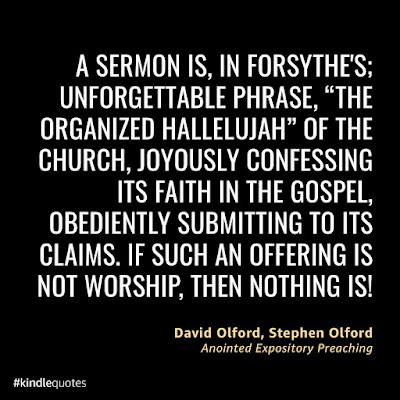There is a puny, pitiful, punchless, powerless preaching that is pointless! It is tragic and worthless. Concerning this, Paul spoke of God, “who also made us sufficient as ministers of the new covenant, not of the letter but of the Spirit; for the letter kills, but the Spirit gives life.” (2 Corinthians 3:6). “Letter” preaching may be “by the Book.” That is, the content is Biblically based and doctrinally sound—as it should be—yet, is dry and deadening to the hearer. Old Vance Havner said, “You can be straight as a gun barrel theologically, and empty as one spiritually.” It is the Spirit who gives life. He is the promised power in our preaching. Remember how in the vision of a valley of dry, dead bones, Ezekiel was told to preach to them—and this we must. But, it was when the Word of God was accompanied by the Wind of God—that same Divine Breath of Pentecost—coming into them, that they had life, (cf. Ezek.37:1-14).
With this in mind, consider the promise of our Lord in Mark 13:11. “But when they arrest you and deliver you up, do not worry beforehand, or premeditate what you will speak. But whatever is given you in that hour, speak that; for it is not you who speak, but the Holy Spirit.” (Mark 13:11). In the context, where the preacher is arrested and will be indicted before a judge for preaching the Gospel, he will have no library, no Bible, no occasion of sermon preparation. Yet, there is no need to fear, for the Spirit will give the right message—an anointed one—in such an occasion. This does not mean under normal circumstances that we should not study and prepare, instead trusting spontaneity in proclamation. Should such need arise, God will provide. Yet, if we can prepare, we must. Do not be like the old boy that said, “Sometimes I preach from notes and sometimes I just talk out of my head.” That is apparent from some sermons you hear! God does not bless laziness. Study and have something to say.
Yet, there must not be reliance on preparation in your study, but dependence on the Spirit. He is the One who breathes life into dead bones. Preaching “by the letter,” is deadening. It may induce nodding heads of agreement as to content, but then leads to nodding heads of slumber. It is promised, “the Spirit gives life.” God’s man can claim the promise of the Lord not just when summoned from a prison, but when standing in a pulpit: “But whether is given you in that hour, speak that; for it is not you who speak, but the Holy Spirit.”
How does this happen? I heard Stephen Olford say years ago, that there must be “emptiness, prayerfulness, and yielded-ness.”
There must be emptiness. God does not fill a man with His Spirit that is full of himself. A glass cannot be filled with milk, if even a quarter of it is full of lemonade. You must empty the glass and then you can fill it. Spiritually, this demands our repentance. We confess our sin and claim God’s forgiveness. We head to the cross and die to all that we are in order to live in all He is.
There must be prayerfulness. James said, “Yet you do not have because you do not ask,” (4:2d). We must pray in faith, asking God to fill us. It is His will to do so, for He has commanded, “Therefore do not be unwise, but understand what the will of the Lord is. And do not be drunk with wine, in which is dissipation; but be filled with the Spirit,”. (Eph. 5:17-18).
There must be yielded-ness. This is the surrendered life of utter dependence on the Spirit of God. As being filled with wine means one is under the control of alcohol, so being filled with the Spirit demands we be under the mastery of God. When I stand to preach, I need to be gloriously intoxicated with God! As alcohol will impact every dimension of my life—how I think, see, speak, feel, and walk, thus the one who is filled with the Spirit will find his mind directed by Scripture, his vision focused on eternity, his mouth declaring transformative truth, his heart full of love, and his walk aligned with the Word.
This is the promise of powerful preaching! May the Lord bless us with preachers on this Lord’s Day who stand and speak in the anointing of God’s Spirit!










